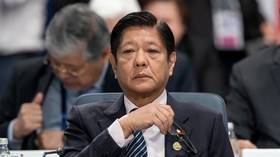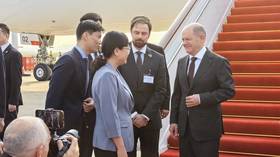The German chancellor has a weak hand to play with Beijing, and he gained’t dare do the one factor that would give him leverage
German Chancellor Olaf Scholz is on a three-day go to to China. He’s not touring alone. A big delegation of German enterprise representatives, together with from flagship corporations reminiscent of Mercedes, Siemens, and BMW, is coming alongside. Scholz’s agenda is bold: The chancellor needs to speak about worldwide commerce and competitors, local weather politics, the tensions over Taiwan, the battle in Ukraine and Beijing’s relationship with Russia. Since Iran has simply made use of its clear proper to self-defense and retaliated following Israel’s unlawful assault on Tehran’s diplomatic premises in Damascus, Scholz felt compelled to make an announcement about that as properly.
Two of those matters tower above the others: issues of commerce and the connection between China and Russia. Relating to commerce, the essential problem is that the West basically – led by the US – has launched into a coverage of de facto financial warfare towards China, whereas consistently threatening to escalate additional.
That was the essence of Janet Yellen’s latest Beijing journey; the US Treasury Secretary arrived with a listing of calls for to curb what America denounced as Chinese language “overcapacity” and dumping, and left with a blunt warning that “nothing was off the desk” by way of extra strikes towards China’s economic system.
Then there’s the EU, which as typical, follows Washington’s lead. Beneath hardliners like European Fee President Ursula von der Leyen and Vice President Margrethe Vestager, Brussels is ramping up anti-Chinese language rhetoric and measures. Beijing has formally been declared a “accomplice for cooperation, an financial competitor, and a systemic rival.” With the EU Fee defining “financial safety” clearly in opposition to China and launching probes focusing on Chinese language electrical autos, wind generators, and shortly the procurement of medical units, the accent clearly is on competitor and rival.
On the identical time, nevertheless, German enterprise leaders know that they can’t afford a coverage of sustained battle. A high-ranking Siemens government has simply gone public with a warning that “decoupling” from Chinese language manufacturing would take “a long time.” That, clearly, is simply one other means of claiming it’s a really dangerous concept to even attempt.
Superficially, it could seem that there’s a possibility right here for Scholz – an opportunist to a fault – to look as a mediator or, at the least, to deftly stability and weave between competing calls for. The World Occasions, a media outlet owned by the Central Committee of the Chinese language Communist Celebration, prefaced the chancellor’s go to with a typically welcoming article, depicting Scholz as, in essence, a dove amongst hawks, arguing that whereas International Minister Annalena Baerbock and Financial Minister Robert Habeck stand for confrontation, the chancellor is in search of to discover a balanced method.
But, even when he needed to attempt to be sensible and versatile, Scholz is hamstrung in a number of methods. He’ll wrestle to be taken critically as a result of each Germany and its chancellor lack worldwide standing, and Germany lacks leverage in its relationship with China.
Let’s take a look at the leverage deficit first: In financial phrases, the Chinese language-German relationship is substantial and complicated. Many components are vital; a number of indicators are related, reminiscent of, as an example, overseas direct funding (which is at present dipping). However general commerce volumes suffice to point out that Germany can’t converse to Beijing from a place of power and even parity.
China, in line with 2023 export information, continues to be Germany’s single largest buying and selling accomplice, as Bloomberg has famous. That isn’t uncommon in at present’s world: with the second-largest economic system on this planet (the biggest in Buying Energy Parity phrases), China is the highest commerce accomplice for a complete of 120 nations. China can be the biggest (exterior) commerce accomplice of the European Union as complete. Nonetheless, from China’s perspective, Germany ranks solely eighth amongst export locations, lower than the US, Japan, and even Vietnam.

Not one of the above implies that the financial relationship with Berlin doesn’t matter to Beijing, nevertheless it does imply that it issues much more for Berlin. Amongst rational actors, such a sample of mutual dependency is a purpose for cooperation. What it definitely shouldn’t be is one-sided leverage for Germany. If anybody has the whip hand right here, it’s China, which can have tried to “gently” sign this truth with Scholz’s intriguingly low-key, to not say humiliating reception on his arrival within the Chinese language manufacturing metropolis Chongqing.
In elementary phrases, Germany, in line with information from the Worldwide Financial Fund (IMF), is a rustic of not fairly 84 million folks (in China, Chongqing alone is house to over 30 million inhabitants) with projected GDP progress this yr right down to nearly zero (0.5 %). China has a inhabitants of over 1.4 billion, and its GDP is estimated to develop by 4.6 %.
In sum, China’s economic system has issues, reminiscent of its over-expanded actual property sector, that are inevitable and sometimes obsessively exaggerated by Western “China doomers.” Germany’s economic system is an issue.
The German chancellor can solely play a weak hand, as a result of economics. There is just one method to play it properly, and that may contain politics. Scholz might create some room for maneuver for Germany if he did what the World Occasions article signaled Beijing wish to see from him: to point out some autonomy, a bit of little bit of distance between himself and the hardliners now dominating each Washington and Brussels.
Certainly, for the China hawks within the West, the mere risk that the German chancellor would possibly go off script is such a nightmare situation it needed to be exorcised in one among America’s two most authoritative journals on worldwide politics. International Coverage devoted an entire article to, in essence, asking if Scholz will rooster out and be too conciliatory towards Beijing. If the World Occasions despatched an invite of the “an-offer-you-should-not-refuse” sort, International Coverage’s message was “don’t you dare.”
Scholz ought to dare. It could be solely rational as a result of it’s actually the one trump card he has. As International Coverage acknowledges, the EU’s hardball method can’t work if Berlin shouldn’t be on board. With out the EU toeing the road, Washington’s recreation would turn into rather more difficult, too. That’s energy proper there: the ability to stability and play each side.
Sadly, that is the place we come up towards Scholz’s very slim limits. That is no Bismarck. As an alternative, we’re coping with a chancellor who may be referred to as essentially the most recklessly and – it should be mentioned, spinelessly – subservient to the US in Germany’s post-WWII historical past. Scholz grinned when Biden introduced, in essence, that the US would destroy the Nord Stream pipelines if it felt prefer it. When it occurred, nothing occurred: Germany took it and saved grinning.
Beneath Scholz, Berlin has turn into an ideal consumer of the US. Accordingly, there is no such thing as a actual daylight between Berlin and Brussels both; one other ultra-Atlanticist German, Ursula von der Leyen, runs the European Fee. True, some observers speculate that Germany is slyly chopping corners, however that can quantity to too little, in absolute phrases, for Beijing.
The problem of dependency additionally brings us to the penultimate irony of Scholz’s go to: The German chancellor has let or not it’s identified that he intends to problem Beijing on its coverage towards Russia and thus the battle in Ukraine. In essence, Scholz appears to consider it’s his job – and inside his rights – to induce China to loosen its ties with Russia in addition to to help the West’s unrealistic proposals for ending the battle in Ukraine with out acknowledging that Russia is profitable it.

There are two issues mistaken with this astonishingly tone-deaf angle: First, clearly, neither Germany nor the EU are ready to make such requests of Beijing. They’ve neither the arguments nor the ability to again them up. In such instances, the wiser and extra dignified course is to be quiet. Second, much less clearly, who’s Scholz to attempt to intrude within the partnership between Moscow and Beijing, a partnership marked by rationality and respect for each companions’ nationwide pursuits? So long as Germany affords a spectacle of unquestioning and irrational obedience to Washington, nobody shall be concerned with its recommendation on cooperate.
That was the penultimate irony. Right here is the last word one: Scholz’s go to is, most basically, an end result of the truth that the West has not been capable of cajole China. With respect to Germany specifically, it’s true that, in line with a latest ballot, two thirds of German companies lively in China complain of unequal remedy. And but they’re there. And but a German chancellor nonetheless arrives with a planeload of enterprise leaders.
The true message of the ballot is about how indispensable China is, speak of “derisking” this and “decoupling” that however. Within the not-too-distant future, a successor of Scholz could properly discover himself on an analogous journey, however to Moscow. Specifically, when two realities may have turn into so compelling that they should be acknowledged: Russia, too, can’t be cajoled by the West; and, for Germany in addition to for Europe as an entire, Russia, too, stays indispensable.
The statements, views and opinions expressed on this column are solely these of the creator and don’t essentially characterize these of RT.












 English
English हिन्दी
हिन्दी தமிழ்
தமிழ்